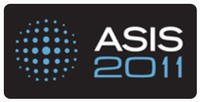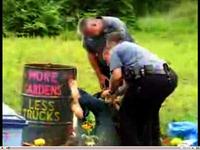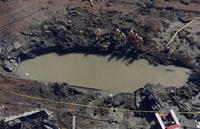-
Defying governor, Mass. officials seek to join Secure Communities

Local law enforcement officials and state lawmakers are increasingly working to circumvent Massachusetts governor Deval Patrick’s decision to opt out of the controversial Secure Communities immigration program; last Wednesday U.S Senator Scott Brown (R-Massachusetts) called on DHS secretary Janet Napolitano to allow the state to join Secure Communities without Governor Patrick’s approval; Under Secure Communities, a detained individual’s fingerprints are automatically scanned and checked against DHS and FBI databases to determine their immigration status
-
-
Connecticut town considers charging centers for power outages
Following Hurricane Irene which left thousands without power up and down the East Coast, a town in Connecticut is considering building several charging stations for residents to power up their hand held electronics during a natural disaster or prolonged power outage
-
-
NYPD has means to take down a plane "in very extreme situation"
The NYPD created a counterterrorism unit following the 9/11 attacks; New York City Police Commissioner Ray Kelly said that the counterterrorism unit has the means to take down an aircraft “in a very extreme situation”
-
-
Georgia shows app that prepares state residents, guides them to safety
New Ready Georgia mobile app uses geo-location to deliver alerts, create emergency plans, and show shelter locations; from up-to-the-minute weather and hazard alerts based on a user’
‘s location, to customizable emergency preparedness checklists, the app combines a set of features not previously available in one mobile application -
-
Task force releases Secure Communities report amid internal discord
Last week, a government task force created to offer recommendations on how to fix the controversial Secure Communities immigration program released its findings to a chorus of internal disagreement; the committee recommended that DHS restart Secure Communities and “reintroduce” the program due to its unpopularity among immigration advocates, local residents, as well as state and local officials; as an act of protest, five of the nineteen committee members resigned because they did not agree with the report’s conclusions
-
-
ASIS 2011 -- combating cyber extremists

At this year’s ASIS International conference, security experts will explore the effect of the Internet on terrorism, how extremist organizations are using it, and what can be done to stop it; the web has largely proven to be a boon to society, but malicious actors like terrorists have used the Internet to disseminate their radical ideas, recruit new members, and share weapons and bomb building training manuals; terrorist websites have proven to be reliable sources for intelligence as well as dangerous meeting places, but shutting them down has proven to be more complicated than anticipated
-
-
Michigan creates cyber and physical infrastructure protection department
The state of Michigan is now merging responsibility for both physical and digital infrastructure protection under one organization
-
-
Emergency communication remains a challenge ten years after 9/11
Chris Russo, a twenty-five year firefighting veteran, a 9/11 first responder, and the founder of ELERTS Corporation, discusses the challenges first responders face in communicating with each other in major disasters, the lack of progress made to create an inter-operable system for emergency responders, and how technology is changing how authorities communicate and interact with the public during major disasters
-
-
California lawmakers approve Dream Act
Last week California legislators approved a controversial bill that would allow undocumented workers to receive state loans for college
-
-
Michigan could dodge defense cuts

With Congress seeking to make potential cuts in defense spending and contractors bracing for reductions across the country, Michigan’s $385 billion defense industrial base remains optimistic as it could get by unscathed; key lawmakers say the types of services that Michigan’s defense industry provides could keep it from becoming the target of the newly formed Joint Selection Committee on Deficit Reduction
-
-
Taser-related fatalities raise safety concerns

As police across the United States increasingly turn to Taser guns as a non-lethal weapon, the device’s safety has come under scrutiny following several recent deaths involving Tasers; last week the Fayetteville police department in North Carolina recalled all of its Taser M26 units following the death of a fifty-six year old political activist who died after being stunned by police
-
-
NYPD works with suburban police to stop terrorism
In the ten years since 9/11, the New York City police department (NYPD) has worked to forge closer ties with local police departments in an effort to stop terrorist attacks; “The idea is to add rings of security,” explained chief inspector John Hodges of the Westchester County police; “What’s changed since 9/11 is New York City has learned that people who might want to bring something into New York City will have to infiltrate from somewhere outside,” he said
-
-
Groups seek FCC ruling on BART’s cell phone shutdown
An ongoing legal battle in California over whether law enforcement agencies can shut off cell phone service could set the precedent for policies across the United States; in response to the Bay Area Rapid Transit’s (BART) decision to shut down its mobile phone service during a planned protest, several digital rights groups are urging the U.S. Federal Communications Commission (FCC) to take swift action
-
-
Survey finds U.S. Muslims happy, despite perceived discrimination
A new poll shows that a majority of Muslim-Americans feel singled out by U.S. anti-terrorism policies and many say they have increasingly been the victim of threats and harassment by airport security, law enforcement officers, and others; despite feeling singled out by the government Muslim-Americans are satisfied with life in the United States and have no sense of rising alienation or anger
-
-
Report finds poor management cause of San Bruno natural gas explosion

An investigation into the cause of a natural gas pipeline explosion that killed eight people and destroyed dozens of homes in San Bruno, California, placed the blame squarely on fifty-four years of bad management by Pacific Gas & Electric Company (PG&E) and the failure of state and federal regulators to notice the problem
-
More headlines
The long view
Smaller Nuclear Reactors Spark Renewed Interest in a Once-Shunned Energy Source
In the past two years, half the states have taken action to promote nuclear power, from creating nuclear task forces to integrating nuclear into long-term energy plans.
